
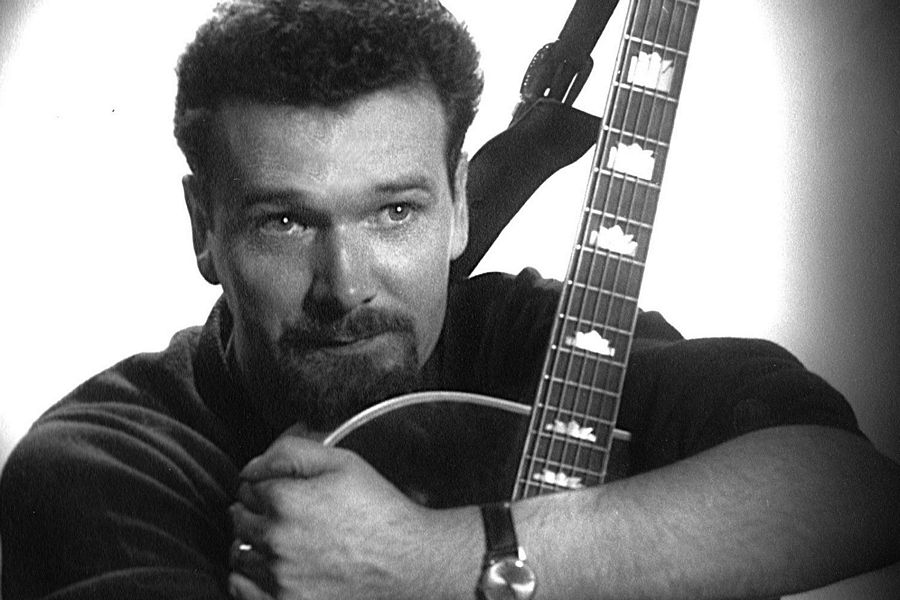
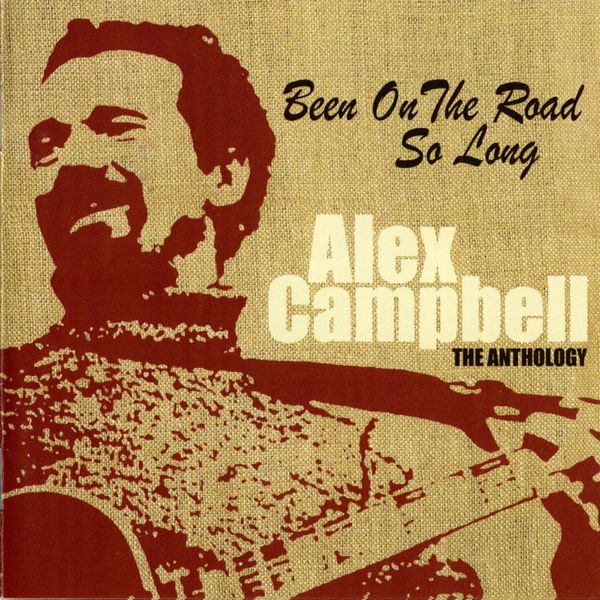 |
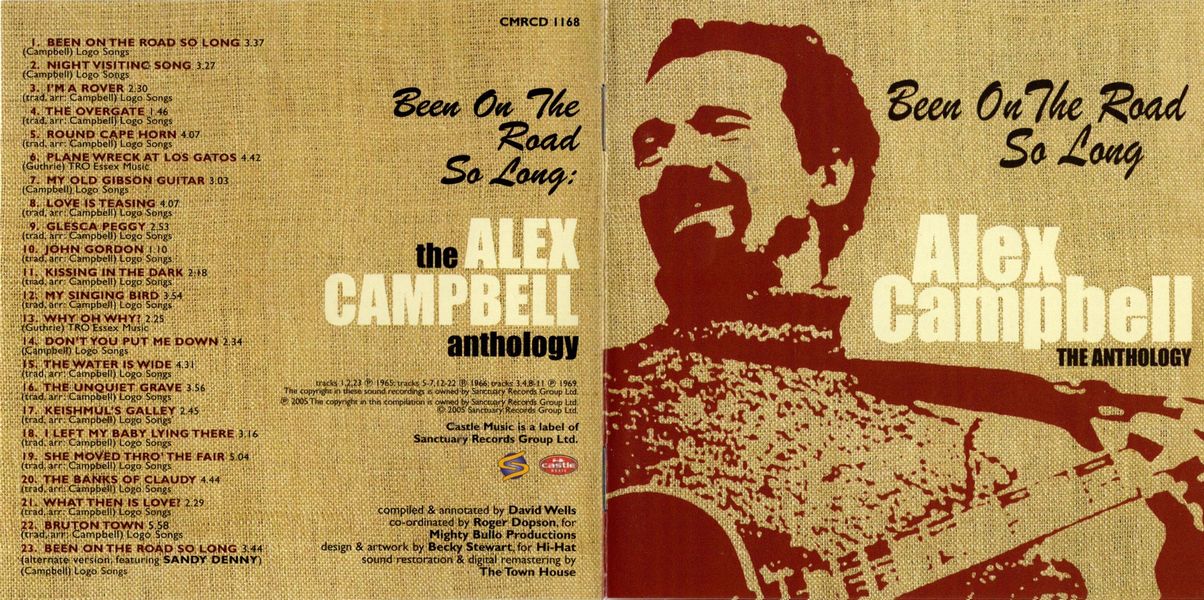
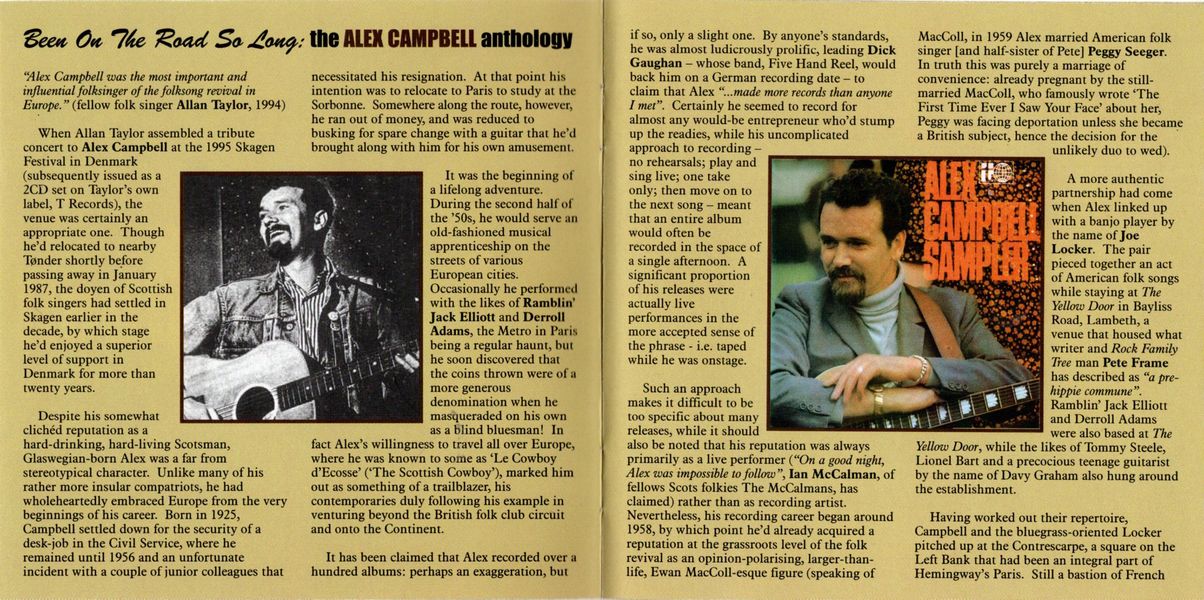
|
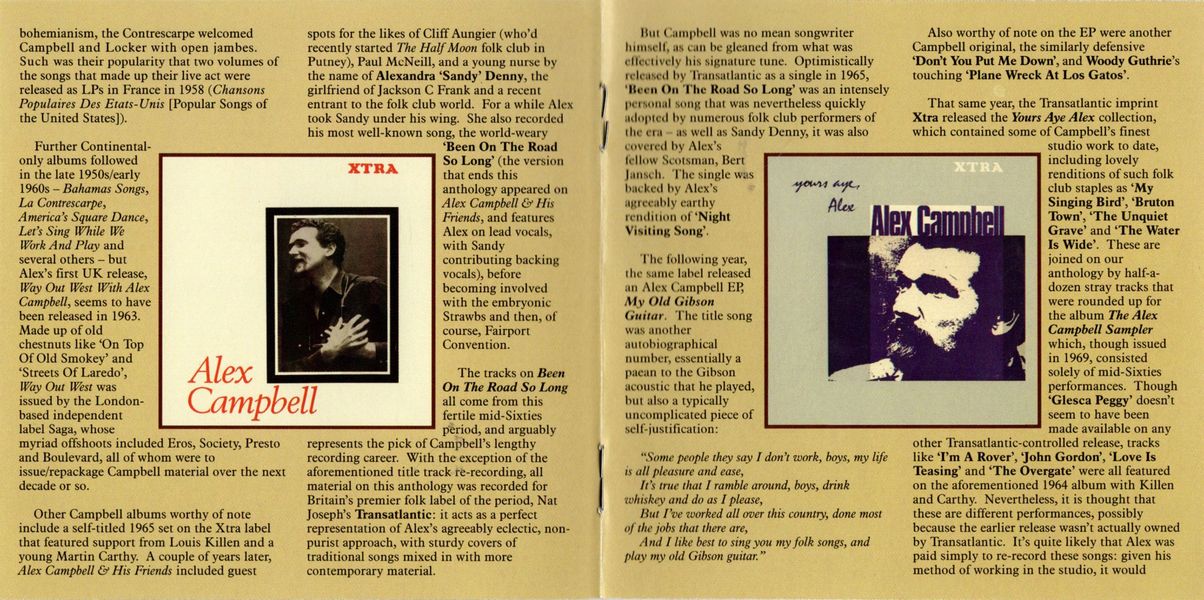
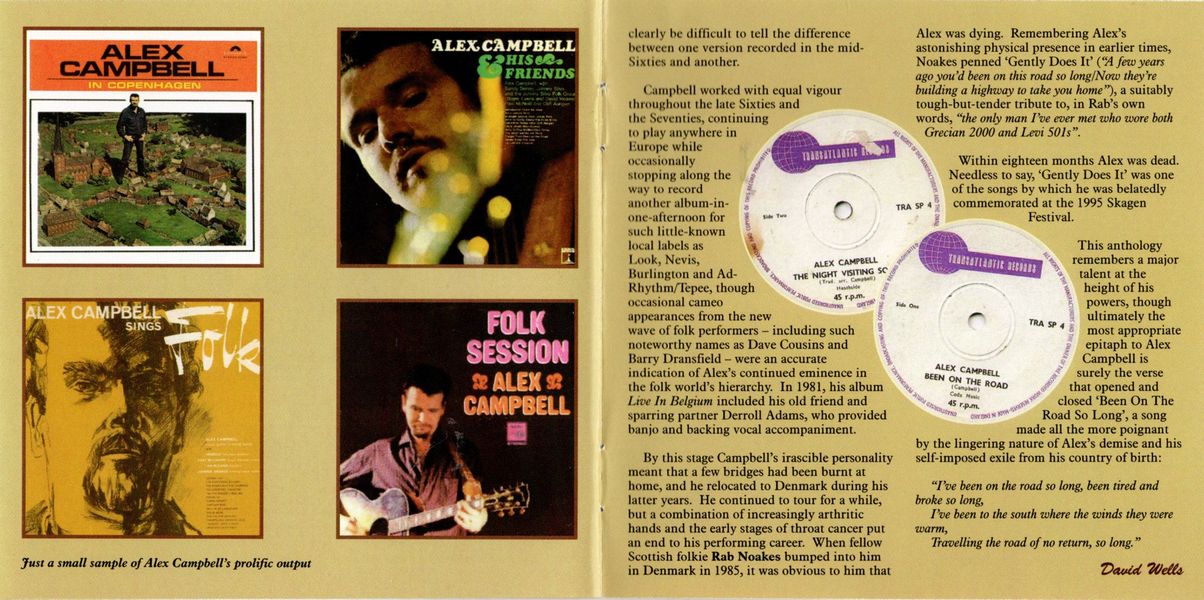
|
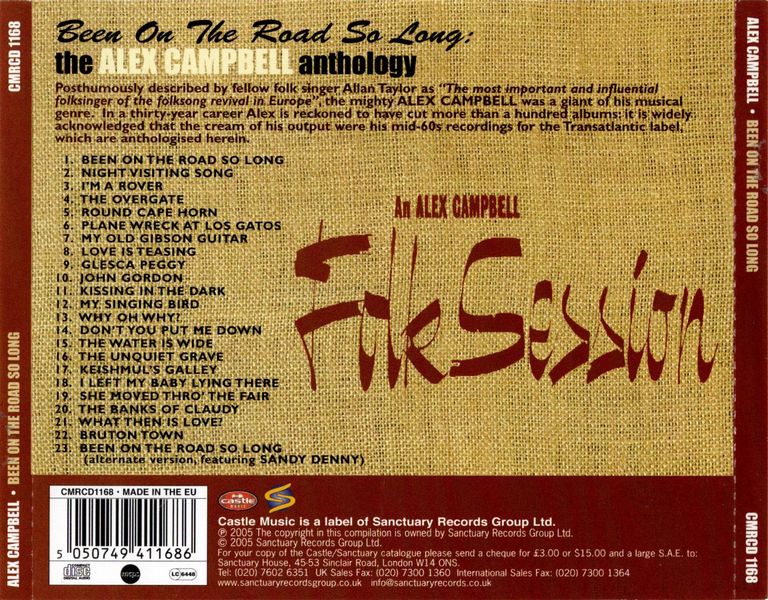
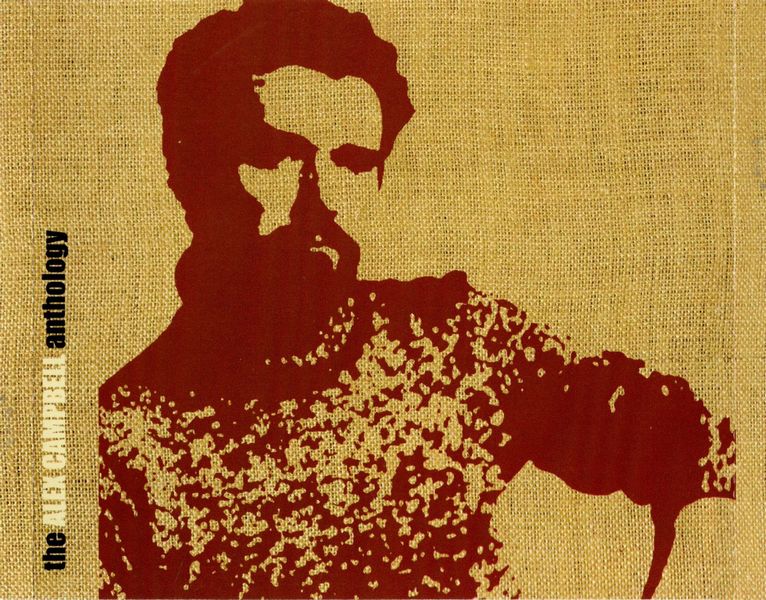
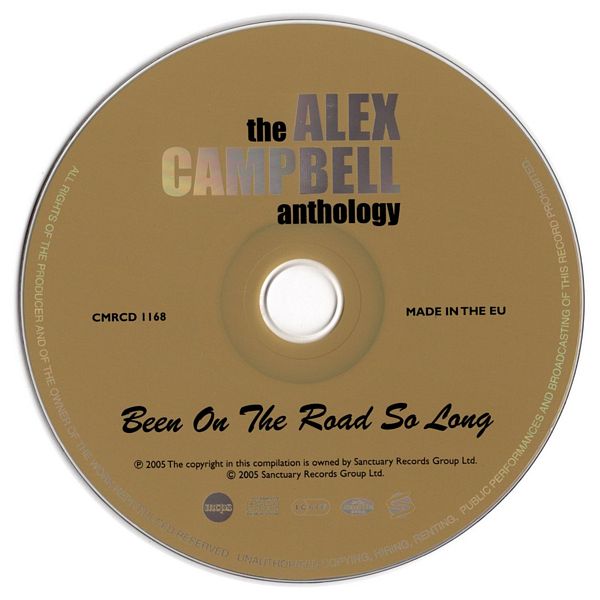 |
Sleeve Notes
"Alex Campbell was the most important and influential folksinger of the folksong revival in Europe." (fellow folk singer Allan Taylor, 1994)
When Allan Taylor assembled a tribute concert to Alex Campbell at the 1995 Skagen Festival in Denmark (subsequently issued as a 2CD set on Taylor's own label, T Records), the venue was certainly an appropriate one. Though he'd relocated to nearby Tønder shortly before passing away in January 1987, the doyen of Scottish folk singers had settled in Skagen earlier in the decade, by which stage he'd enjoyed a superior level of support in Denmark for more than twenty years.
Despite his somewhat clichéd reputation as a hard-drinking, hard-living Scotsman, Glaswegian-born Alex was a far from stereotypical character. Unlike many of his rather more insular compatriots, he had wholeheartedly embraced Europe from the very beginnings of his career. Born in 1925, Campbell settled down for the security of a desk-job in the Civil Service, where he remained until 1956 and an unfortunate incident with a couple of junior colleagues that necessitated his resignation. At that point his intention was to relocate to Paris to study at the Sorbonne. Somewhere along the route, however, he ran out of money, and was reduced to busking for spare change with a guitar that he'd brought along with him for his own amusement.
It was the beginning of a lifelong adventure. During the second half of the '50s, he would serve an old-fashioned musical apprenticeship on the streets of various European cities. Occasionally he performed with the likes of Ramblin' Jack Elliott and Derroll Adams, the Metro in Paris being a regular haunt, hut he soon discovered that the coins thrown were of a more generous denomination when he masqueraded on his own as a blind bluesman! In fact Alex's willingness to travel all over Europe, where he was known to some as 'Le Cowboy d'Ecosse' ('The Scottish Cowboy'), marked him out as something of a trailblazer, his contemporaries duly following his example in venturing beyond the British folk club circuit and onto the Continent.
It has been claimed that Alex recorded over a hundred albums: perhaps an exaggeration, but if so, only a slight one. By anyone's standards, he was almost ludicrously prolific, leading Dick Gaughan — whose band, Five Hand Reel, would back him on a German recording date — to claim that Alex "...made more records than anyone I met". Certainly he seemed to record for almost any would-be entrepreneur who'd stump up the readies, while his uncomplicated approach to recording — no rehearsals; play and sing live; one take only; then move on to the next song — meant that an entire album would often be recorded in the space of a single afternoon. A significant proportion of his releases were actually live performances in the more accepted sense of the phrase — i.e. taped while he was onstage.
Such an approach makes it difficult to be too specific about many releases, while it should also be noted that his reputation was always primarily as a live performer ("On a good night, Alex was impossible to follow", Ian McCalman, of fellows Scots folkies The McCalmans, has claimed) rather than as recording artist. Nevertheless, his recording career began around 1958, by which point he'd already acquired a reputation at the grassroots level of the folk revival as an opinion-polarising, larger-than-life, Ewan MacColl-esque figure (speaking of MacColl, in 1959 Alex married American folk singer [and half-sister of Pete] Peggy Seeger. In truth this was purely a marriage of convenience: already pregnant by the still-married MacColl, who famously wrote 'The First Time Ever I Saw Your Face' about her, Peggy was facing deportation unless she became a British subject, hence the decision for the unlikely duo to wed).
A more authentic partnership had come when Alex linked up with a banjo player by the name of Joe Locker. The pair pieced together an act of American folk songs while staying at The Yellow Door in Bayliss Road, Lambeth, a venue that housed what writer and Rock Family Tree man Pete Frame has described as "a prehippie commune". Ramblin' Jack Elliott and Derroll Adams were also based at The Yellow Door, while the likes of Tommy Steele, Lionel Bart and a precocious teenage guitarist by the name of Davy Graham also hung around the establishment.
Having worked out their repertoire, Campbell and the bluegrass-oriented Locker pitched up at the Contrescarpe, a square on the Left Bank that had been an integral part of Hemingway's Paris. Still a bastion of French bohemianism, the Contrescarpe welcomed Campbell and Locker with open jambes. Such was their popularity that two volumes of the songs that made up their live act were released as LPs in France in 1958 (Chansons Populaires Des Etats-Unis [Popular Songs of the United States]).
Further Continental-only albums followed in the late 1950s/early 1960s — Bahamas Songs, La Contrescarpe, America's Square Dance, Let's Sing While We Work And Play and several others — but Alex's first UK release, Way Out West With Alex Campbell, seems to have been released in 1963. Made up of old chestnuts like 'On Top Of Old Smokey' and 'Streets Of Laredo', Way Out West was issued by the London-based independent label Saga, whose myriad offshoots included Eros, Society, Presto and Boulevard, all of whom were to issue/repackage Campbell material over the next decade or so.
Other Campbell albums worthy of note include a self-titled 1965 set on the Xtra label that featured support from Louis Killen and a young Martin Carthy. A couple of years later, Alex Campbell & His Friends included guest spots for the likes of Cliff Aungier (who'd recently started The Half Moon folk club in Putney), Paul McNeill, and a young nurse by the name of Alexandra 'Sandy' Denny, the girlfriend of Jackson C Frank and a recent entrant to the folk club world. For a while Alex took Sandy under his wing. She also recorded his most well-known song, the world-weary 'Been On The Road So Long' (the version that ends this anthology appeared on Alex Campbell & His Friends, and features Alex on lead vocals, with Sandy contributing backing vocals), before becoming involved with the embryonic Strawbs and then, of course, Fairport Convention.
The tracks on Been On The Road So Long all come from this fertile mid-Sixties period, and arguably represents the pick of Campbell's lengthy recording career. With the exception of the aforementioned title track re-recording, all material on this anthology was recorded for Britain's premier folk label of the period, Nat Joseph's Transatlantic: it acts as a perfect representation of Alex's agreeably eclectic, non-purist approach, with sturdy covers of traditional songs mixed in with more contemporary material.
But Campbell was no mean songwriter himself, as can be gleaned from what was effectively his signature tune. Optimistically released by Transatlantic as a single in 1965, Been On The Road So Long' was an intensely personal song that was nevertheless quickly adopted by numerous folk club performers of the era as well as Sandy Denny, it was also covered by Alex's fellow Scotsman, Bert Jansch. The single was backed by Alex's agreeably earthy rendition of 'Night Visiting Song'.
The following year, the same label released an Alex Campbell EP My Old Gibson Guitar. The title song was another autobiographical number, essentially a paean to the Gibson acoustic that he played, but also a typically uncomplicated piece of self-justification:
"Some people they say I don't work, boys, my life is all pleasure and ease,
It's true that I ramble around, boys, drink whiskey and do as I please,
But I've worked all over this country, done most of the jobs that there are,
And I like best to sing you my folk songs, and play my old Gibson guitar. "
Also worthy of note on the EP were another Campbell original, the similarly defensive 'Don't You Put Me Down', and Woody Guthrie's touching 'Plane Wreck At Los Gatos'.
That same year, the Transatlantic imprint Xtra released the Yours Aye Alex collection, which contained some of Campbell's finest studio work to date, including lovely renditions of such folk club staples as 'My Singing Bird', 'Bruton Town', 'The Unquiet Grave' and 'The Water Is Wide'. These are joined on our anthology by half-a-dozen stray tracks that were rounded up for the album The Alex Campbell Sampler which, though issued in 1969, consisted solely of mid-Sixties performances. Though 'Glesca Peggy' doesn't seem to have been made available on any other Transatlantic-controlled release, tracks like 'I'm A Rover', 'John Gordon', 'Love Is Teasing' and 'The Overgate' were all featured on the aforementioned 1964 album with Killen and Carthy. Nevertheless, it is thought that these are different performances, possibly because the earlier release wasn't actually owned by Transatlantic. It's quite likely that Alex was paid simply to re-record these songs: given his method of working in the studio, it would clearly be difficult to tell the difference between one version recorded in the mid-Sixties and another.
Campbell worked with equal vigour throughout the late Sixties and the Seventies, continuing to play anywhere in Europe while occasionally stopping along the way to record another album-in-one-afternoon for such little-known local labels as Look, Nevis, Burlington and Ad-Rhythm/Tepee, though occasional cameo appearances from the new wave of folk performers — including such noteworthy names as Dave Cousins and Barry Dransfield — were an accurate indication of Alex's continued eminence in the folk world's hierarchy. In 1981, his album Live In Belgium included his old friend and sparring partner Derroll Adams, who provided banjo and backing vocal accompaniment.
By this stage Campbell's irascible personality meant that a few bridges had been burnt at home, and he relocated to Denmark during his latter years. He continued to tour for a while, but a combination of increasingly arthritic hands and the early stages of throat cancer put an end to his performing career. When fellow Scottish folkie Rab Noakes bumped into him in Denmark in 1985, it was obvious to him that Alex was dying. Remembering Alex's astonishing physical presence in earlier times, Noakes penned 'Gently Does It' ("A few years ago you'd been on this road so long/Now they're building a highway to take you home"), a suitably tough-but-tender tribute to, in Rab's own words, "the only man I've ever met who wore both Grecian 2000 and Levi 501s".
Within eighteen months Alex was dead. Needless to say, 'Gently Does It' was one of the songs by which he was belatedly commemorated at the 1995 Skagen Festival.
This anthology remembers a major talent at the height of his powers, though ultimately the most appropriate epitaph to Alex Campbell is surely the verse that opened and closed 'Been On The Road So Long', a song made all the more poignant by the lingering nature of Alex's demise and his self-imposed exile from his country of birth:
"I've been on the road so long, been tired and broke so long,
I've been to the south where the winds they were warm,
Travelling the road of no return, so long. "
David Wells